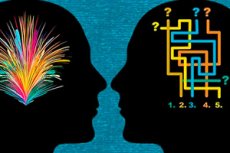Medical expert of the article
New publications
Functions of thinking: the basis of the human mind
Last reviewed: 30.06.2025

All iLive content is medically reviewed or fact checked to ensure as much factual accuracy as possible.
We have strict sourcing guidelines and only link to reputable media sites, academic research institutions and, whenever possible, medically peer reviewed studies. Note that the numbers in parentheses ([1], [2], etc.) are clickable links to these studies.
If you feel that any of our content is inaccurate, out-of-date, or otherwise questionable, please select it and press Ctrl + Enter.

Thinking is a unique and complex function of the human brain that allows us to analyze information, solve problems and think creatively. It plays a key role in our ability to adapt to our environment, make decisions and create new ideas. In this article we will look at the main functions of thinking and their importance to human performance.
Basic functions of thinking
Information processing
- Analysis and synthesis: thinking allows you to break down complex information into its components and synthesize new information from existing data.
- Classification and comparison: it includes the ability to categorize objects and phenomena, compare and identify similarities and differences.
Problem solving
- Logical reasoning: thinking allows you to apply logic to find solutions, formulate conclusions and hypotheses.
- Creative problem solving: it also involves creative approaches to unforeseen situations and complex problems.
Decision-making
- Evaluating alternatives: thinking is involved in weighing different options and choosing the best solution.
- Planning and forecasting: it helps in planning actions and predicting future events and consequences.
Communication and language
- Formulating thoughts: language and thinking are closely related; thinking helps to structure and express thoughts.
- Comprehension and interpretation: it is also important for understanding and interpreting language messages and texts.
Self-awareness and reflection
- Making sense of experience: thinking allows for reflection on personal experience, introspection and self-evaluation.
- Personality formation: through thinking, a person's beliefs, values, and worldview are formed.
The importance of thinking
- Adaptation: thinking helps to adapt to changes in the environment, to respond quickly to new challenges and problems.
- Innovation and progress: the creative aspect of thinking drives innovation, scientific discovery and cultural development.
Developing and improving thinking
Developing your thinking skills is a process that requires conscious effort and constant practice. Here are some ways you can improve your thinking skills:
- Continuing education: regular study, reading books and scientific articles, watching educational programs help stimulate thought processes.
- Critical thinking: ask questions, analyze information from different angles, look for hidden assumptions and logical fallacies in both others' and your own statements.
- Memory and attention training: memory, attention and concentration exercises help improve your ability to remember and process information.
- Problem solving: regularly set yourself tasks that require out-of-the-box solutions. This could be working on crosswords, puzzles or math problems.
- Creative activities: artistic activities such as drawing, music-making or writing help to develop creative thinking.
The impact of technology on thinking
Modern technology has a significant impact on our thought processes. On the one hand, they provide access to a wealth of information and educational resources. On the other hand, over-reliance on technology can lead to a decrease in mental alertness and critical thinking. It is important to find a balance between the use of technology and independent thinking.
The social and cultural dimension of thinking
Human thinking is shaped not only by individual experience, but also by social and cultural context. Social norms, cultural traditions and the educational system can significantly influence the ways of thinking and perceiving the world.
Thinking is a multifunctional tool that plays a central role in a wide range of human activities. From solving everyday tasks to developing scientific theories and creating art, all of these processes are impossible without thinking. Understanding its functions helps us to become more aware of our own cognitive processes and utilize the potential of our minds more effectively.

